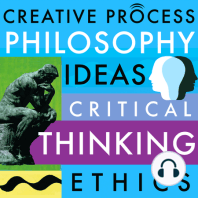12 min listen

Philip Fernbach - Co-author of “The Knowledge Illusion” - Cognitive Scientist - Co-Director of Ctr. for Research on Consumer Financial Decision Making
Philip Fernbach - Co-author of “The Knowledge Illusion” - Cognitive Scientist - Co-Director of Ctr. for Research on Consumer Financial Decision Making
ratings:
Length:
55 minutes
Released:
Sep 22, 2022
Format:
Podcast episode
Description
Philip Fernbach is an Associate Professor of Marketing and Co-Director of the Center for Research on Consumer Financial Decision Making at the University of Colorado, Boulder, Leeds School of Business. He’s published widely in the top journals in cognitive science, consumer research and marketing, and received the ACR Early Career Award for Contributions to Consumer Research. He’s co-author with Steve Sloman of The Knowledge Illusion: Why We Never Think Alone, which was chosen as a New York Times Editor’s Pick. He’s also written for NYTimes, Harvard Business Review, and his research has been featured in the Wall Street Journal, The Washinton Post, National Public Radio, and the BBC. He received his Ph.D. in cognitive science from the Department of Cognitive, Linguistic and Psychological Sciences at Brown and his undergraduate degree in Philosophy from Williams College. He teaches data analytics and behavioral science to undergraduate and Masters students."Human beings are not built for individual cognition. We're not built to master every detail about the world. Our minds are not made for storing a lot of details about the way that the world works because the world is just too complex for any one individual to master too much about it. Instead, what human beings are really designed for is collaborative cognition. We distribute knowledge across our communities, and we have sort of a division of cognitive labor where some people master certain pieces and other people master others. And then we've developed cognitive capacities for jointly pursuing complex goals together by sharing knowledge.And so that seems to be at the core of what makes human beings really spectacular and really special. However the fact that knowledge works that way, where individuals don't know very much, but then the group knows a lot, what ends up happening is just by virtue of participating in a group, what we call a community of knowledge, we tend to feel like we understand things better than we do because we're surrounded by other people who might have the information."www.colorado.edu/business/www.philipfernbach.comThe Knowledge Illusionwww.creativeprocess.infowww.oneplanetpodcast.org
Released:
Sep 22, 2022
Format:
Podcast episode
Titles in the series (100)
Highlights - Bertrand Piccard - Explorer, Founder, Solar Impulse Foundation: 1000+ Profitable Climate Solutions: Conversation on profitable climate change solutions, Solar Impulse Flight, spirituality, changing legal framework and norms by Philosophy, Ideas, Critical Thinking, Ethics & Morality: The Creative Process: Philosophers, Writers, Educators, Creative Thinkers, Spiritual Leaders, Environmentalists & Bioethicists